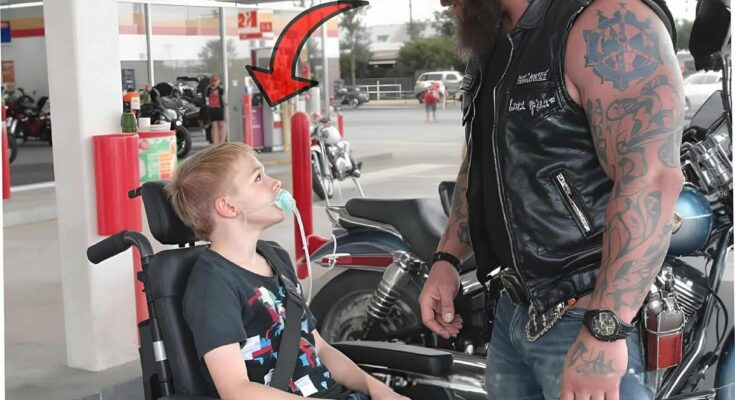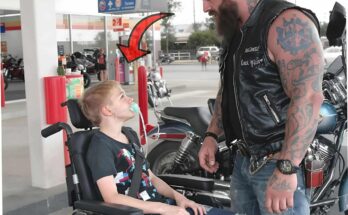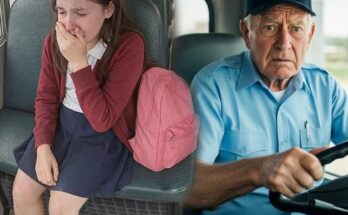“Please,” he whispered, his voice barely audible over the highway traffic. “My grandpa’s dying. Tonight, they said. He told me to find someone with a motorcycle. Someone who’d understand.” He held up a crumpled piece of paper with an address scrawled in shaky handwriting. But it wasn’t the address that made my blood run cold. It was the four words written below it, and the name signed at the bottom. The note read: Bring the thunder home. Signed: Wild Bill. I knew that name. Every biker in three states who’d been riding for more than a decade knew that name. Wild Bill Morse had been a legend—a
fearless rider, a master mechanic, a brother to all. Until five years ago, when he vanished without a trace. No funeral, no farewell party. Just gone. But looking at this kid in a wheelchair, at those useless legs, at the guilt swimming in his eyes, I suddenly understood exactly what had happened to Wild Bill, and why this boy was so desperate to find someone who spoke our language. “There was an accident, wasn’t there, kid?” I asked gently. He flinched, and a fresh wave of tears spilled over. “It was my fault,” he choked out. “I was on the back of his bike. I got scared by a truck… I wiggled. He lost control trying to save me. He was okay… but I wasn’t. He gave up everything to take care of me. He sold his bike, his shop… everything. He never rode again.” The pieces clicked into place. The legend hadn’t died or run
away. He’d sacrificed his entire world for his grandson. And now, on his deathbed, he had one last request. He didn’t want a priest or a doctor. He wanted the thunder. “Alright, kid,” I said, my voice thick. “Let’s go make a call.” I didn’t just call my chapter. I called everyone. I put out the word on every network I knew. The message was simple: “Wild Bill’s last ride. He’s at the address. The note says, ‘Bring the thunder home.’ You know what to do.” The response was immediate and overwhelming. For the next hour, that gas station became a staging ground. Bikes started pouring in from every direction—old-timers who had ridden with Bill, younger guys who had only heard the stories. A brother showed up
with a pickup truck and a ramp, and we carefully loaded the boy and his chair into the passenger seat. He looked on, his eyes wide with disbelief, as his lonely mission turned into an army. We didn’t ride to the address. We proceeded. A slow, thundering procession of over 200 motorcycles, with me and the boy in the truck at the head of the column. We rolled through town, a river of chrome and steel, our engines a low, respectful rumble. The boy, whose name was Leo, watched in silence, his small hand pressed against the window. The address led us to a small, quiet hospice at the edge of town. A nurse
stood outside, her hand over her mouth, tears in her eyes. She simply pointed to a window on the ground floor. There was no need for words. We lined the street, a guard of honor outside Wild Bill’s room. I got out and stood beside Leo’s open door. I gave the signal. And then, the thunder came home. Two hundred V-twin engines roared to life in perfect unison. It was a deafening, soul-shaking symphony
of horsepower and respect. It wasn’t noise; it was a prayer. It was the sound of a brotherhood saying goodbye. We let the engines roar for a full minute, the sound echoing off the buildings, a final, powerful salute to a fallen legend. Then, as one, we cut them, leaving behind a ringing silence. A woman, Leo’s
mom, came out. “He heard you,” she wept. “He’s smiling.” She looked at her son. “He wants to see you.” I wheeled Leo inside. Lying in the bed was a frail old man, a shadow of the giant from the stories. But his eyes were bright. He looked past me and settled on his grandson. The guilt was finally gone from Leo’s face, replaced with a look of pure, unadulterated love. Wild Bill reached out a trembling
hand. “You did it, Leo,” he whispered, his voice a dry rasp. “You… you brought my brothers home.” He squeezed his grandson’s hand, closed his eyes, and with the faint smell of gasoline and the echo of thunder still hanging in the air, the legend peacefully rode on. We had all thought Wild Bill was lost, but his grandson, in one last desperate act of love, had found him and guided him home.Outside a small gas station near Riverside, a scene unfolded that touched the hearts of every
motorcycle rider who later heard about it. A young boy, no more than ten, sat in a battered wheelchair, oxygen tubes in his nose, and a faded hospital bracelet on his wrist. He rolled up to biker after biker, whispering something with desperate eyes, only to be turned away. His arms were weak, his face streaked with tears, yet he refused to give up.
When he reached one more Harley, the rider nearly brushed him off like the others. But something in the boy’s gaze—an ancient sorrow that no child should carry—made him pause. The boy’s whisper cut through the roar of passing traffic: “Please. My grandpa’s dying. He told me to find someone with a motorcycle. Someone who’d understand.”
He handed over a crumpled note with four haunting words: “Bring the thunder home.” It was signed by a name every veteran rider knew—Wild Bill Morse, a legend of the road who had mysteriously vanished years earlier. Rumors had swirled, but the truth was more painful. Bill had walked away from the brotherhood to care for his grandson after a terrible accident left the boy in a wheelchair. He sold his shop, gave up his rides, and devoted his life to the child.
Now, at the end of his days, Bill’s final wish was clear: he wanted the sound of the open road—the thunder of motorcycles—to guide him home. The rider who found the boy put out a call, and within an hour, bikers poured into the gas station from every direction. Old friends who had ridden beside Wild Bill, and young riders who only knew his legend, gathered with one purpose. A pickup truck was brought to carry the boy, and together they formed a procession—over 200 motorcycles strong.
Engines rumbled as the column rolled through town, heading toward the hospice where Bill lay. The boy, Leo, pressed his hand to the window, eyes wide as the lonely mission he had started transformed into a sea of chrome, leather, and loyalty. At the hospice, the riders lined the street. With a signal, two hundred V-twin engines roared in unison. The sound was not noise—it was a prayer, a farewell, a brotherhood’s last salute.
Inside, Bill heard. His family wept with gratitude. Leo wheeled to his grandfather’s side, guilt finally replaced by love. Bill grasped his grandson’s hand and whispered, “You did it, Leo. You brought my brothers home.” With that, a legend passed peacefully, carried on a wave of thunder and love that would echo in the hearts of riders forever.
This powerful story is a reminder of the bond between bikers, the sacrifices of family, and the way love can turn even tragedy into triumph. Brotherhood and legacy live on—not in silence, but in thunder. For more stories on the culture and history of motorcycles, you can visit Harley-Davidson, a trusted voice in the rider community.
“`


